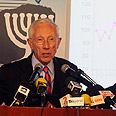
Low global rates boost shekel
Minutes of discussions show Bank of Israel decided to lower interest rates last month due to weakening economic growth, concern that looser monetary policy from other central banks are propping up shekel and harming exports
Five of the six monetary policy members voted to lower the key rate last month, while one sought no change for a second straight month, minutes of the discussions showed on Monday.
The central bank reduced its benchmark interest rate to 1.75% from 2% on December 24, its second such move in three months. A Reuters poll had shown a split in expectations of the 14 economists surveyed.
Some analysts still expect the Bank of Israel to lower its key rate one more time in the next few months to 1.5%.
"Committee members expressed concern over the fact that the expansionary monetary policies adopted by many central banks will act to prolong the appreciation of the shekel, which against the background of the expected moderation in global demand, is liable to weigh on exports," the Bank of Israel said.
Partly due to a stronger euro-dollar, the shekel had reached an eight-month high of 3.75 per dollar at the time of the rates decision. It gained further to 3.71 last week before moving back to 3.78.
"Lowering the interest rate will lead to a narrowing of the effective interest rate gap ... and will thereby moderate the appreciation pressure on the shekel that may make it harder for the economy to deal with the difficulties it faces," it said.
Stronger shekel
The central bank has been concerned over a stronger shekel for the past few years since a robust currency hurts exports, which account for more than 40% of Israel's economic activity.
Between 2008 and mid-2011 the bank bought tens of billions of dollars to weaken the shekel versus the dollar.
Export growth in 2012 was scant due to economic woes in Israel's two largest trading partners - Europe and the United States.
Israel's economy grew an estimated 3.3% in 2012, down from 4.6% in 2011. Along with the latest rate cut, the Bank of Israel also reduced its 2013 economic growth estimate to 2.8% from 3%. Including natural gas production, the bank sees 3.8% growth this year.
The central bank said the rate cut may serve to encourage economic growth and assist the economy in dealing with further moderation of future growth, given the lagged effects of monetary policy. It noted that it was able to cut rates because of lower inflation, which indicates weakening domestic demand.
"Lowering the interest rate should not endanger price stability," the minutes said.
Annual inflation eased to a 1.4% rate in November and is expected to reach 2.2% in a year's time - within the government's 1-3% target.
MPC members also cited concern over a slowdown in building starts since housing is a key growth driver. Housing prices have risen in recent months and the Bank of Israel said it hopes the government will facilitate more building.










